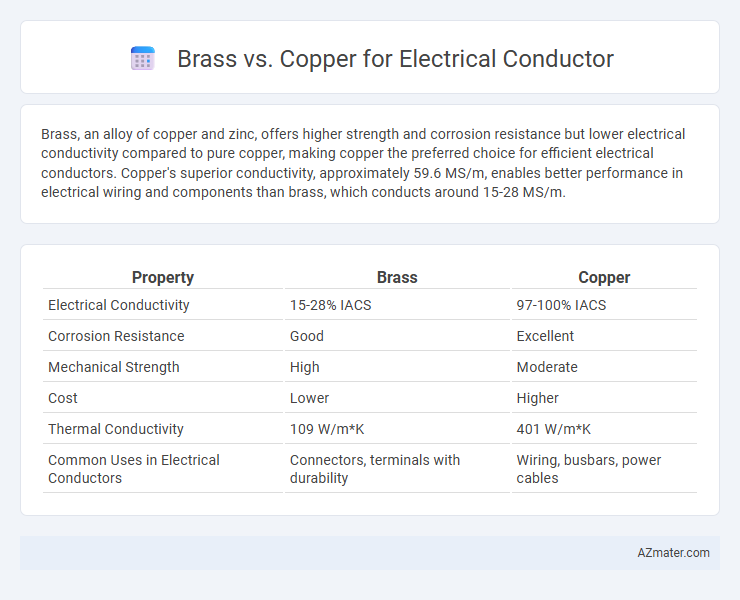Brass, an alloy of copper and zinc, offers higher strength and corrosion resistance but lower electrical conductivity compared to pure copper, making copper the preferred choice for efficient electrical conductors. Copper's superior conductivity, approximately 59.6 MS/m, enables better performance in electrical wiring and components than brass, which conducts around 15-28 MS/m.
Table of Comparison
| Property | Brass | Copper |
|---|---|---|
| Electrical Conductivity | 15-28% IACS | 97-100% IACS |
| Corrosion Resistance | Good | Excellent |
| Mechanical Strength | High | Moderate |
| Cost | Lower | Higher |
| Thermal Conductivity | 109 W/m*K | 401 W/m*K |
| Common Uses in Electrical Conductors | Connectors, terminals with durability | Wiring, busbars, power cables |
Introduction to Brass and Copper as Electrical Conductors
Brass and copper are widely used electrical conductors, each offering unique properties tailored to different applications. Copper stands out for its superior electrical conductivity of approximately 5.8 x 10^7 S/m, making it the industry standard for wiring and electrical components. Brass, an alloy primarily composed of copper and zinc, provides enhanced mechanical strength and corrosion resistance but has lower conductivity, typically around 15-30% less than pure copper.
Electrical Conductivity: Brass vs Copper
Copper exhibits significantly higher electrical conductivity than brass, with a conductivity rating of approximately 59.6 MS/m compared to brass's 15-28 MS/m, depending on its composition. This superior conductivity makes copper the preferred choice for electrical wiring and components where efficient current flow is critical. Brass, an alloy primarily of copper and zinc, is used in applications requiring greater mechanical strength and corrosion resistance but compromises some electrical conductivity.
Composition and Material Properties
Brass is an alloy primarily composed of copper and zinc, offering enhanced strength and corrosion resistance compared to pure copper, which is a highly conductive metal with excellent electrical conductivity. Copper's conductivity typically measures around 5.8 x 10^7 S/m, making it superior for electrical conduction, while brass conductivity varies significantly depending on the zinc content, usually ranging from 1.5 to 3.5 x 10^7 S/m. The material properties of copper, such as high ductility and thermal conductivity, make it ideal for wiring and electrical components, whereas brass's hardness and durability suit applications where mechanical strength is also critical.
Cost Comparison: Brass vs Copper
Copper offers superior electrical conductivity but comes at a higher cost compared to brass, which contains copper alloyed with zinc and is more affordable. Brass typically costs 30-50% less per pound than pure copper, making it a cost-effective choice for applications where conductivity demands are lower. Budget considerations often lead to brass being preferred in electrical components where moderate electrical performance is acceptable.
Corrosion Resistance and Durability
Brass, an alloy of copper and zinc, exhibits excellent corrosion resistance due to its ability to withstand oxidation and environmental exposure better than pure copper. Copper, while highly conductive, is prone to surface tarnish and oxidation over time, which can impact its long-term durability in harsh conditions. The enhanced corrosion resistance of brass makes it a preferred choice for electrical conductors in environments with moisture and chemical exposure, ensuring sustained performance and reduced maintenance.
Mechanical Strength and Flexibility
Brass exhibits higher mechanical strength compared to copper, making it more resistant to wear and deformation under stress, which is advantageous in applications requiring durability. However, copper outperforms brass in flexibility and ductility, allowing for easier bending and shaping without cracking, essential for intricate wiring and connections. The choice between brass and copper as electrical conductors depends on balancing the need for mechanical robustness with the necessity for flexibility in specific electrical installations.
Applications in Electrical Engineering
Copper is widely preferred in electrical engineering for its excellent electrical conductivity, low resistance, and high ductility, making it ideal for wiring, motors, and transformers. Brass, an alloy of copper and zinc, offers good corrosion resistance and mechanical strength but has lower conductivity, limiting its use to connectors, terminals, and applications where durability outweighs conductivity. The choice between brass and copper conductors depends on balancing electrical performance requirements with mechanical and environmental considerations.
Thermal Conductivity in Electrical Systems
Copper exhibits significantly higher thermal conductivity, approximately 400 W/m*K, compared to brass, which ranges between 100 to 130 W/m*K, making copper more efficient in dissipating heat in electrical systems. This superior heat transfer capability reduces the risk of overheating and improves the overall reliability and efficiency of electrical conductors. Brass, an alloy primarily composed of copper and zinc, offers greater mechanical strength but compromises on thermal performance, limiting its use in applications requiring optimal heat conduction.
Ease of Fabrication and Machinability
Brass exhibits superior machinability compared to copper due to its alloy composition, making it easier to cut, shape, and assemble in complex electrical components. Copper, while highly conductive, is softer and tends to gall or deform under machining, which can increase production time and tooling wear. The enhanced ease of fabrication with brass benefits applications requiring precision and repeatability in electrical conductor manufacturing.
Choosing the Right Material: Key Considerations
Brass offers enhanced mechanical strength and corrosion resistance, making it ideal for terminals and connectors requiring durability, while copper provides superior electrical conductivity, crucial for minimizing power loss in cables and wiring. When choosing between brass and copper, consider factors like conductivity requirements, environmental exposure, and mechanical stress to balance performance and longevity. Cost implications and ease of fabrication also play significant roles in selecting the optimal material for specific electrical applications.

Infographic: Brass vs Copper for Electrical Conductor
 azmater.com
azmater.com